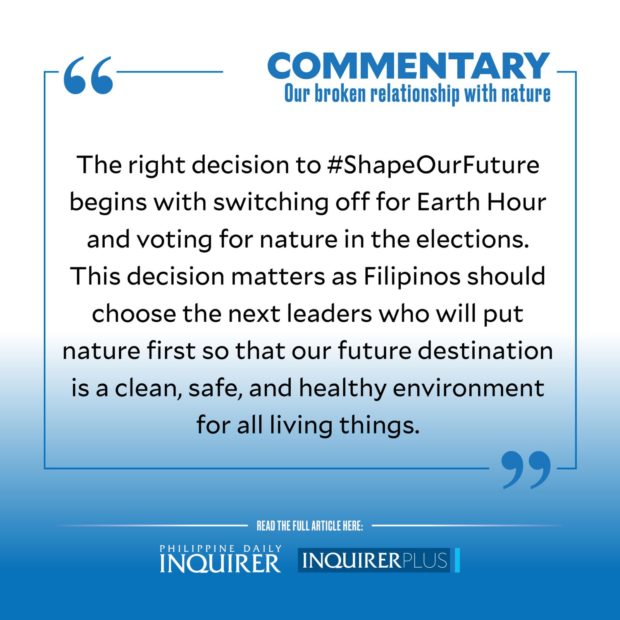Every act has an impact. Every action has a reaction. And every decision leads to a destination. Earth Hour 2022 comes amid the hectic campaign season of the elections, where Filipinos will make the important decision of selecting the next leaders of the country. They must choose who they think will use their power to take care of the Philippines’ environment and biodiversity, push for climate justice and a renewable energy future, and champion a people-centered sustainable development.
The United Nations Intergovernmental Panel on Climate Change (IPCC)’s newest report warns that there is something wrong with how humans live on Earth — using and consuming resources, producing emissions, and altering ecosystems—that needs to be fixed. Ignoring the adverse effects of these actions and continuing with business-as-usual will lead to undesirable consequences for both people and the planet.
Like several earlier reports, the IPCC findings show a world in danger because of climate change, compounded by the pressures of human activity. Though current adaptation actions have made a difference, these are still insufficient. Ecosystems have already been transformed; the pollution and destruction happening in nature continue at a pace that will lead to “irreversible impacts” on nature and human civilization.
The report emphasizes that it is increasingly difficult to tackle climate change as the multiplicity of hazards, risks, and impacts become ever more complex and hard to manage. Typhoons are already a way of life for Filipinos, but they will come with greater intensity as the warming continues. With every incremental increase in global temperatures, more adaptation investments must be made urgently and rapidly as the window to prevent irreversible damages to the planet is becoming narrower every passing year. Curbing carbon emissions is still essential if we are to keep below the 1.5 degrees Celsius temperature threshold.
The most significant sources of carbon emissions globally are in developed countries, but we also have polluters in our own backyard. In a 2021 study by Ocean Cleanup, several Philippine rivers were among the top 50 rivers in the world that carry pollution into the open ocean. Fossil fuel plants are still operating and in the pipeline. Other environmental issues we face include destructive mining, deforestation, illegal wildlife trade, improper waste management, marine habitat degradation, and air pollution.
The country’s next leaders should understand the science of climate change and its link to nature and have the strong will to implement mitigation and adaptation measures to ensure we have a chance at a climate-resilient future.
Let’s stop the outdated notion that we should not mix the environment with politics. The reality is that the government regulates the use of our natural resources. Our next leaders must set and effectively implement policies that favor conserving the environment instead of exploiting it for profits. We need to speak out about environmental issues, asking those in government positions, current and future, what are your plans, and how will you do it?
Based on the way things are going now, we clearly have a broken relationship with nature. We exploit it for the sake of greed and do not think that what we do to nature comes back to us. Fortunately, we can still mend that relationship, learning from hard lessons and painful experiences, by bringing together our individual and collective actions to address climate change and nature loss as we adapt to a climate-defined future.
In celebrating Earth Hour 2022 on the last Saturday of March, WWF continues to push for everyone to decide to choose nature. The right decision to #ShapeOurFuture begins with switching off for Earth Hour and voting for nature in the elections. This decision matters as Filipinos should choose the next leaders who will put nature first so that our future destination is a clean, safe, and healthy environment for all living things.
* * *
Angela Consuelo Ibay is head of the Climate and Energy Programme of the World Wide Fund for Nature-Philippines.


